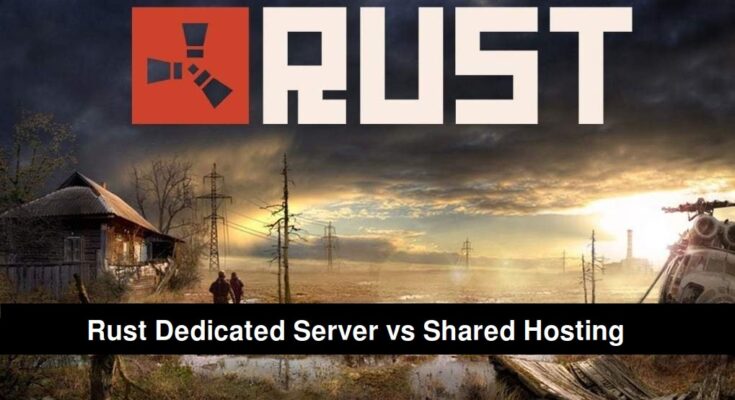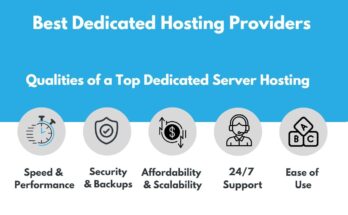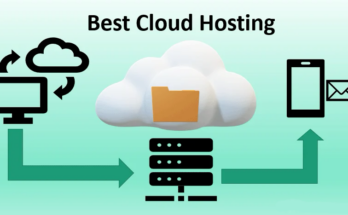When it comes to hosting a Rust server, performance, control, and reliability are everything. Whether you’re starting a private world for friends or managing a growing community with 100+ active players, choosing the right type of hosting can make or break your server’s success.
One of the first and most important decisions you’ll need to make is this: Should you go with a shared hosting plan or invest in a dedicated server?
Both options come with their own set of pros, cons, and costs. Shared hosting is budget-friendly and beginner-ready, while dedicated servers offer full control and superior performance but often at a higher price and complexity.
In this guide, we’ll break down the differences between Rust dedicated servers and shared hosting. We’ll compare them side-by-side in terms of performance, cost, mod support, scalability, and more, so you can confidently choose the best option for your needs and future plans.
Let’s dive in and find out which Rust server hosting solution is right for you.
Table of Contents
What Is Shared Hosting for Rust Servers?
Shared hosting for Rust servers means your game server is hosted on a machine that’s also running multiple other game servers, often for different users. The server’s CPU, RAM, and bandwidth are shared among dozens or even hundreds of users, with each receiving a portion of the available resources.
This type of hosting is typically offered by budget-friendly game hosting companies. It’s designed to be easy to use and quick to set up, making it ideal for beginners or those who just want to jump into the game without worrying about technical setup.
✅ Pros of Shared Hosting
💰 Affordable Pricing
Plans typically start as low as $5–$10/month, depending on player slots and modding needs.⚡ Instant Setup
Most providers offer one-click Rust installation. Your server is usually ready within minutes.🧑💻 No Technical Experience Needed
Everything is managed through a web-based control panel—no need to deal with the command line or server configs.🔒 Managed Security and DDoS Protection
Shared hosts often come with built-in DDoS mitigation and automated backups.🧰 Plugin Support (Basic)
Some hosts include plugin managers or mod libraries for popular uMod plugins.
❌ Cons of Shared Hosting
🚫 Limited Performance
Since you’re sharing resources, you might notice lag during peak hours, especially on busy nodes.🔒 Limited Control
You won’t get full file access or root-level control. Custom scripts, advanced RCON configs, or third-party software may not be supported.⚙️ Restricted Mod Support
Only approved or pre-installed plugins may be allowed, limiting your flexibility.📈 Scalability Issues
Upgrading performance may require switching plans or migrating to a dedicated server entirely.
🧠 Best suited for:
Beginners who want a plug-and-play server
Small groups (1–20 players)
Casual or non-competitive Rust servers
Admins who prefer simplicity over customization
What Is a Dedicated Rust Server?
A dedicated Rust server is a hosting environment where the entire server (physical or virtual) is allocated solely to you. Unlike shared hosting where your server competes for resources a dedicated server gives you full control over CPU, RAM, storage, network bandwidth, and system-level configurations.
Dedicated hosting is ideal for admins who want maximum performance, deep customization, and the ability to scale without limitations.
You can either:
Rent a bare-metal server from a data center or host
Deploy a virtual dedicated instance (VPS or cloud-based VM) with root access
✅ Pros of Dedicated Rust Servers
⚡ Superior Performance
You’re not sharing resources; your game server gets full access to the machine’s power, reducing lag and improving tick rate consistency.🔧 Full Control
You can customize every aspect of your server: install custom mods, tweak startup parameters, change OS-level settings, and run other tools like bots, analytics, or monitoring agents.📈 Better Scalability
Add RAM, CPU cores, or disk space as needed. Some providers allow live scaling or offer high-performance plans out of the box.📂 Multi-Server Hosting
Run multiple Rust instances (or even different games) from the same machine. Useful for hosting wipe test servers, PvE and PvP modes, or event-only maps.💡 Ideal for Communities
Perfect if you’re running a public or monetized Rust server with frequent traffic, custom plugins, or community features like Discord bots or player stats pages.
❌ Cons of Dedicated Rust Servers
💸 Higher Cost
Dedicated servers usually start at $50–$150+/month, depending on specs and location.🧠 Requires Technical Knowledge
You’ll need to be comfortable managing Linux or Windows servers, updating Rust manually, securing ports, and handling crashes or plugin errors.🛠 Maintenance Is on You
Tasks like OS updates, security patches, backups, plugin installs, and server optimizations are your responsibility unless you pay extra for managed support.
🧠 Best suited for:
Large public servers or modded communities
Admins with technical experience or a developer on the team
Long-term projects, monetized servers, or streamers
Anyone who needs fine-tuned control and room to grow
Side-by-Side Comparison Table
Still unsure which option is right for your Rust server? Here’s a quick side-by-side comparison of shared hosting vs dedicated servers to help you make an informed decision at a glance.
| Feature | Shared Hosting | Dedicated Server |
|---|---|---|
| Performance | Shared with other users | 100% of system resources dedicated to you |
| Setup Time | Instant (1-click deployment) | Manual or semi-automated setup |
| Technical Knowledge | None required | Requires command-line and server administration |
| Mod/Plugin Support | Limited (approved plugins only) | Full uMod/Oxide, custom scripts, total control |
| Server Access | Web control panel only | Full root or RDP access |
| Scalability | Limited to host’s upgrade plans | Scalable based on hardware or cloud configuration |
| Customizability | Limited to preset options | Full OS-level configuration |
| Monthly Cost | $5–$20/month | $50–$150+/month |
| Player Slot Limit | Based on plan (e.g., 10–100 slots) | Limited only by hardware specs |
| Multi-Server Hosting | Not supported | Supported (run multiple Rust/world instances) |
| Security Control | Managed by host | Fully customizable (firewall, ports, monitoring) |
| Backups & Updates | Often automated by host | Manual (unless using tools/scripts) |
| Best For | Beginners, hobbyists, small groups | Power users, modded servers, large communities |
🧠 Quick takeaway:
Shared hosting is great if you want an easy, low-cost server with minimal setup
Dedicated servers are better if you need power, flexibility, and control for a serious or growing community
Which Hosting Type Is Right for You?
Still torn between shared hosting and a dedicated server for your Rust world? Don’t worry—choosing the right option mostly depends on your goals, technical comfort, and how big your community is (or will be).
Let’s break it down by use case.
🧑💻 Choose Shared Hosting If:
You’re new to server hosting and want a simple setup
You only plan to host for you and a few friends (1–20 players)
You don’t want to deal with system updates, mod installs, or server crashes
You’re running a vanilla or lightly modded server
You’re on a tight budget and just want to get started
💡 Ideal for hobbyists, small Discord groups, or anyone who wants a plug-and-play experience.
👨🔧 Choose a Dedicated Server If:
You want complete control over your server configuration and files
You expect 30+ players and care about consistent performance
You’re running a modded, PvE, or high-entity server
You plan to scale your community or host multiple instances
You’re comfortable using Linux/Windows CLI, or you have a tech-savvy team
You want to host custom tools (e.g., Discord bots, monitoring scripts, websites)
💡 Ideal for serious admins, monetized community owners, developers, and content creators.
Cost Breakdown and Value Over Time
While shared hosting and dedicated servers may seem vastly different in price, the long-term value depends on your server goals, growth, and how you plan to manage or monetize your Rust community.
Let’s break down the numbers and the value behind them.
📉 Shared Hosting: Low Upfront Cost, Limited Flexibility
| Feature | Cost Range |
|---|---|
| Monthly Plan | $5 – $20/month |
| Annual Plan | $50 – $200/year |
| Add-ons (extra RAM, slots, etc.) | +$2–$10/month |
You’ll typically pay for:
Player slots (e.g., 20, 50, or 100 players)
Storage upgrades or backups
Plugin access or support tiers
🧠 Over 12 months, shared hosting may cost around $120–$200 total for a mid-sized plan.
✅ Best value if you’re just starting out or testing ideas.
📈 Dedicated Hosting: Higher Cost, More Power and Potential
| Feature | Cost Range |
|---|---|
| Entry-Level Dedicated | $50 – $80/month |
| High-Performance Setup | $100 – $200+/month |
| VPS (virtual option) | $20 – $60/month |
You may also pay for:
OS licensing (Windows Server)
Backup storage or snapshot tools
Control panel licenses (e.g., Pterodactyl, TCAdmin)
🧠 Over 12 months, dedicated hosting could cost $600–$1,500+, depending on your setup.
✅ Worth it if:
You run multiple servers
You monetize your server (e.g., via VIP kits or donations)
You want long-term stability and flexibility
💰 Monetization Offsets the Cost
With a dedicated server, you have the freedom to monetize in ways shared hosting might restrict:
Offer VIP perks or skins
Run donor-only events
Sell custom kits or rewards
Build a subscription-based player community
Even a small player base contributing $5–$10/month each could help cover your server costs entirely.
Can You Switch Later?
Yes, you can absolutely switch between shared hosting and a dedicated server (or vice versa) as your needs evolve. In fact, many Rust server owners start with shared hosting to test the waters and later upgrade to dedicated hosting as their player base and performance needs grow.
However, migration isn’t always as simple as copying and pasting files. Let’s break down what’s involved.
🔄 Moving from Shared Hosting to Dedicated
When upgrading to a dedicated server, you’ll typically need to:
Back up your current server files
Save world files (
map.sav, player blueprints)Export plugin configs (if using uMod/Oxide)
Transfer files to the new machine
Use FTP, SFTP, or file manager tools
Some shared hosts offer automated migration if moving within their platform
Install Rust on the dedicated server
Use SteamCMD for manual setup
Restore your backups to the proper folder structure
Reconfigure ports, startup scripts, and mods
Dedicated servers don’t use the same 1-click panels, so you’ll need to configure launch parameters manually
🔁 Downgrading from Dedicated to Shared Hosting
If you decide a dedicated server is overkill (or want to cut costs), you can migrate back to shared hosting. Just be aware of:
Storage and slot limitations
Possible plugin incompatibilities or missing features
Reduced access to advanced tools/scripts
Always check with your new host about their plugin and mod support, and confirm if your world files and blueprints are compatible with their structure.
🛡️ Things to Watch Out For
IP address change – You’ll need to notify players of the new connection info
Mod/plugin compatibility – Some shared hosts may not support all custom plugins
Downtime – Plan your migration during off-peak hours and announce it to your community in advance
🧠 Pro Tip: Test your server setup privately before going live on the new host.
📌 Related Read: How to Migrate Your Rust Server to a New Host
Conclusion: Shared vs Dedicated – Which Should You Choose?
Choosing between shared hosting and a dedicated Rust server ultimately depends on your goals, your budget, and how much control you want over your server.
Here’s a quick recap:
✅ Go with Shared Hosting if:
You’re new to server hosting
You want a fast, no-hassle setup
You’re hosting for fewer than 20 players
You don’t need custom plugins or scripts
You want a budget-friendly option
✅ Go with a Dedicated Server if:
You need full control and root access
You’re running a public or modded Rust server
You expect 30+ concurrent players
You want to scale or monetize your community
You’re comfortable managing a Linux/Windows server
💡 Still unsure? Start with shared hosting to test the waters, then scale up to dedicated as your needs grow.
📌 Next steps:
Explore Rust Server Hosting: The Ultimate Guide for full setup walkthroughs
Check out Best Rust Hosting Providers (2025) to compare plans
Review Rust Server Requirements before upgrading your hardware or host
Whether you’re building a private playground or a massive multiplayer battleground, the right hosting choice will shape your players’ experience and your sanity as an admin.
🎮 Good luck, and happy hosting!
FAQs
1. Can I start with shared hosting and upgrade later?
Yes, many server admins start with shared hosting for simplicity and low cost, then upgrade to dedicated servers as their community grows. Just be sure to back up your world files and plugin configurations to make the transition smoother.
2. Is a dedicated server overkill for a small Rust server?
For most small servers (under 20 players), yes, a dedicated server might be more power (and cost) than you need. Shared hosting is perfectly fine unless you’re planning to use heavy mods, large maps, or run multiple instances.
3. Can I run plugins on shared hosting?
It depends on the provider. Many shared hosts offer limited plugin support through curated libraries (like uMod plugins). However, you may not be able to upload your own custom scripts or use advanced modding tools unless you're on a dedicated server.




